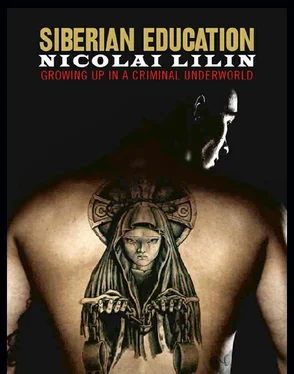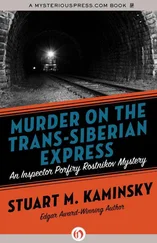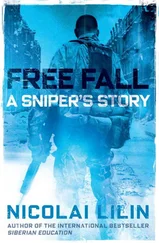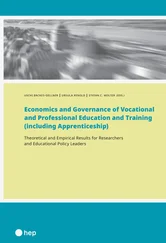Grandfather Kuzya told me everything he knew:
‘Our law says that we mustn’t talk to the cops: do you know why it says that? Not just out of caprice. It says this because the cops are the government’s dogs, the tools the government uses against us. My son, they shot me when I was twenty-three years old, and ever since then I have lived my whole life in humility, without possessing anything – no family, no children, no house: all my life has been spent in prison, suffering, and sharing my sufferings with others. That’s why I have power, because many people know me and know that when I cross my arms on the table I don’t speak in my own private interest, but for the good of everyone. That, my boy, is why in our world everyone trusts me. And now tell me why we should trust those who have spent their whole lives killing our brothers, locking us up in prison, torturing us and treating us as if we didn’t belong to the human race? How is it possible, tell me, to trust those who live thanks to our deaths? Cops are different from the rest of humanity, because they have an innate desire to serve, to have an employer. They don’t understand anything about freedom, and they’re scared of free men. Their bread is our sorrow, my son; how is it possible to reach an agreement with these people?’
Everything Grandfather Kuzya told me helped me to cope with reality, not to become the slave of a mistaken idea or a never-realized dream. I knew with certainty that I was witnessing the death of our society and so I tried to survive, passing through this great vortex of souls, human stories, from which I was drifting further and further away.
Every time I went to see Grandfather Kuzya, my mother would give me a bag of home-cooked food. My mother was an excellent cook; in our district she was renowned for her red soup, her wels catfish stuffed with rice, vegetables and apples, her pâté of caviare and butter, her country-style fish soup and, especially, her cakes. Grandfather Kuzya called her ‘little mother’: that’s how the criminals express the greatest respect and admiration for women. Whenever I took him something made by my mother, he would say:
‘Lilya, Lilya, my sweet little mother! Kiss your hands all the time, there’s nothing else we can do!’
Outside Grandfather Kuzya’s house there was an old wooden bench. He would often sit there and watch the river. I would settle down next to him and we would sit there all day like that, sometimes till evening. He would recount to me the adventures of his own life, or the stories of the Siberian Urkas, which I loved. We sang songs. He was very good at singing, and knew a lot of criminal songs by heart. I had a good memory; I only had to hear a song a couple of times and I’d remember it instantly. Grandfather Kuzya was very pleased about this, and he would always ask me before he sang:
‘Do you remember this one?’
‘I certainly do! It’s my favourite!’
‘Well done, young rascal! Sing along with me, then!’ And we’d sing together, often arriving late for supper.
What I liked most of all was when Grandfather Kuzya told me about Siberia: the stories of the Urkas, of how they had opposed the regime of the tsar and that of the communists. It was wonderful, because in those stories you felt the thread that held my family together, and connected the people of the past with those of the present. Thanks to this thread everything seemed much more believable, real.
While he was narrating, he would almost always emphasize the link between the characters and the people we met every day in the street, to make me understand that although times had changed, the values had remained the same.
Grandfather Kuzya had been one of the first Siberians to arrive in Transnistria. He told the story of that move with sorrow, and it was clear that he had many dark feelings inside him, connected with that time.
‘The soldiers arrived in the village at night. There were lots of them, all armed, with bayonets fixed, as if they were going to war… I was only small, about ten years old; my parents had died a long time ago, and I lived with some good people who had raised me as if I were their own son. The men were all away, in the Tayga; there was no one in the village but the old men, and the women with the children. I remember they entered the house without knocking and without taking their boots off. There was a man dressed in a black leather jacket and trousers. I remember the smell of that leather; it was sickening, unbearable. He looked at us and asked Pelagea, the lady of the house:
‘“Do you have any news of your husband? Do you know where he is?”
‘“He’s gone hunting in the Tayga. I don’t know when he’ll be back…”
‘“I thought as much. Right, put on some warm clothes, take only the most essential things, go outside and line up with the others.” This man was a commander; he had the air of someone who knew he had power in his hands.
‘“But what’s happening? Why do we have to get dressed and go outside? It’s night; the children are asleep…” Pelagea was agitated and her lips trembled as she spoke.
‘The man stopped for a moment, looked carefully round the room and went over to the red corner, where the icons were: he picked one up and hurled it against the wall. The icon broke in two. He picked up some other icons, put them in the stove and said:
‘“In ten minutes we’re going to set fire to the village. If you want to stay here and be burnt alive, please yourselves.”
‘Pelagea had five children; the youngest was four, the eldest thirteen. In addition she looked after me and a fourteen-year-old girl, Varya, who had also lost her parents. She was a good woman, and very brave. Calmly she explained to us children that there was nothing to be afraid of, that everything was in the hands of the Lord. She made us dress in warm clothes, fetched the gold she kept in a safe place and hid it in our clothes. She took some ash from the stove and dirtied Varya’s face; she did this deliberately, to make her ugly, because she was afraid the soldiers would rape her.
‘“If they ask you anything, don’t speak, don’t look them in the face, let me do the talking. Everything will be all right.”
‘She took a big bag full of bread and dried meat and we went out.
‘Outside there were a lot of people; the soldiers were looting the houses, breaking doors and windows and carrying off various objects, especially the golden frames of the icons. They had made a bonfire in the middle of the road, onto which they threw icons and crucifixes. Everyone was standing outside their houses, helplessly watching this disaster.
‘An officer went along the lined-up people with a soldier, and whenever he saw an old person he ordered the soldier:
‘“This one, out!” and immediately the person he had picked out was run through with a bayonet. They were eliminating anyone who might slow down the trek.
‘A young woman, the mother of three children, was taken by a group of soldiers into a house, where they raped her. Suddenly she rushed out naked, screaming in despair, and from the window of the house a soldier shot her in the back: she fell down on the snow, dead. One of her children, the eldest, ran towards her, crying out; a nearby soldier hit him on the head with the butt of his rifle, and the boy fell to the ground unconscious.
‘Then an officer shouted angrily:
‘“Who fired that shot? Who was it?”
‘The soldier who had fired out of the window emerged, looking sheepish.
‘“It was me, comrade!”
‘“Are you out of your mind? The order was only to fire in an emergency! Use your bayonet – I don’t want to hear any gunfire! If those in the woods hear us, we’ll never make it to the train!” He was agitated, and immediately afterwards he ordered an NCO: “Hurry up! Set fire to the houses and get the people lined up, start the march!”
Читать дальше










